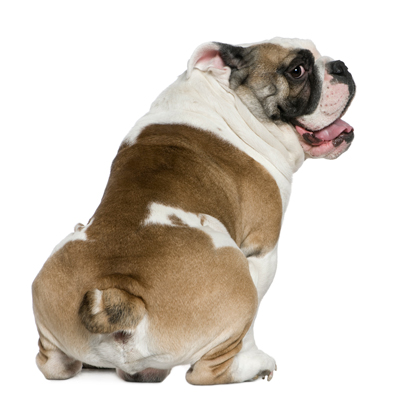We’re Going There: Your Pet’s Anal Gland Health
If the title alone isn’t enough to scare you away, odds are you’re acutely aware of this unpleasant fact of nature. As a pet owner, it doesn’t get much worse than cuddling up on the couch with your furry companion and then getting a whiff of something absolutely foul. That pungent secretion comes from your pet’s anal sacs and its spontaneous release is a problem for some pets more than others.
The Role Of The Anal Sacs
Whenever your dog meets a new animal, you’ve probably noticed he foregoes hand-shaking and goes straight to, well, butt-sniffing. That’s because anal glands serve as powerful scent glands that communicate a number of things about the animal, such as sex, approximate age, and general health. Consider the pair of anal sacs as your pet’s unique identifier.

The anal sacs are located between the internal and external anal sphincter muscles on each side of your pet’s anus. The sacs are lined with a bounty of oil and sweat glands, producing a “semi-oily, brownish fluid that packs an odor,” according to PetMD.
In the wild, dogs and cats most likely had the ability to squeeze their rear-end muscles and spray this semi-liquid to mark their territory. Through domestication and selective breeding, however, this ability has been lost to most. Instead, many pets are forced to lick or scoot their behinds across the floor to try to relieve the build-up of pressure. For others, the sacs will empty when the animal has a bowel movement.
Don’t Blame Your Pet
Your pet can’t control when a leakage occurs. In predicting what dogs will be affected, it really seems to be in the (bad) luck of the draw. Some dogs are born with narrow channels by which the anal gland fluid empties and are more prone to infection, inflammation, and obstruction. Some produce a thicker, drier secretion which is hard or impossible to pass. Some smaller breeds – Beagles, Chihuahuas, Cocker Spaniels, Lhasa Apsos, and Toy and Miniature Poodles – are more prone to problems.
When the anal glands don’t empty properly, they can become impacted. This makes going to the bathroom painful or difficult and can also cause infections or abscesses. A fiber-rich diet may be beneficial as it can create greater pressure which may push against and empty the sacs during a bowel movement, but this is not always the case.
If your pet is experiencing problems with his or her anal glands, call Mandarin Animal Hospital and have them examined by a veterinarian. Some pets need to periodically have the sacs manually emptied. Although your veterinarian can teach you how to do this, most pet owners prefer to pay someone else and save their nose the trauma. If that’s the case for your pet, a technician can do this for a very low fee on a regular basis. In severe cases, your veterinarian may recommend having the anal sacs removed by surgery.